Search the Special Collections and Archives Portal
Search Results
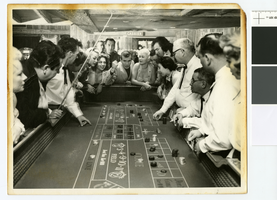
Photograph of gamblers at a craps table in the El Rancho Vegas (Las Vegas), 1950s
Date
Archival Collection
Description
Gamblers at a craps table in the El Rancho Vegas. Stamp on back of photo: "Las Vegas News Bureau, Las Vegas-Nevada, Photographers Don English, Joe Buck, Jerry Abbott, 5108."
Site Name: El Rancho Vegas
Address: 2500 Las Vegas Boulevard South
Image
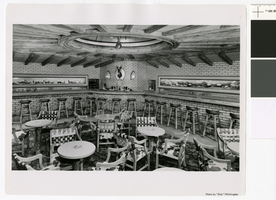
Photograph of the cocktail lounge at the El Rancho Vegas (Las Vegas), circa 1953
Date
Archival Collection
Description
Site Name: El Rancho Vegas
Address: 2500 Las Vegas Boulevard South
Image
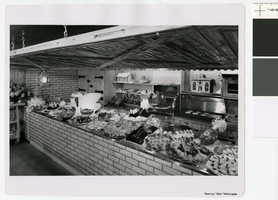
Photograph of the Chuck Wagon Buffet at the El Rancho Vegas (Las Vegas), circa 1953
Date
Archival Collection
Description
The Chuck Wagon Buffet in the El Rancho Vegas with an assortment of food and an ice sculpture of a swan.
Site Name: El Rancho Vegas
Address: 2500 Las Vegas Boulevard South
Image
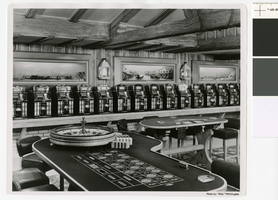
Photograph of the casino area of the El Rancho Vegas (Las Vegas), circa 1953
Date
Archival Collection
Description
Table games and slots in the El Rancho Vegas casino
Site Name: El Rancho Vegas
Address: 2500 Las Vegas Boulevard South
Image
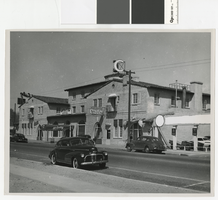
Photograph of the front exterior of the El Cortez Hotel and El Cortez Cafe (Las Vegas), 1940s
Date
Archival Collection
Description
The El Cortez Hotel and El Cortez cafe on Fremont Street. Trancribed from original: "Fremont at 6th. Built by Marion Hicks."'
Site Name: El Cortez
Address: 600 East Fremont Street, Las Vegas, NV
Image
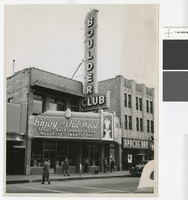
Photograph of the Boulder Club, Las Vegas, Nevada, circa 1945-1947
Date
Archival Collection
Description
The front exterior of the Boulder Club on Fremont Street in Las Vegas. A picture of Hoover (then Boulder) Dam is seen in the middle of the marquee. The Apache Bar and Savoy Club can be seen on either side of the Boulder Club.
Site Name: Boulder Club
Address: 118 East Fremont Street
Image
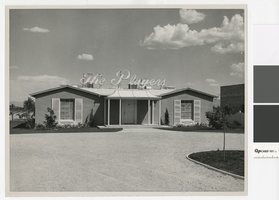
Photograph of the front exterior of The Players Club (Las Vegas), between 1944-1949
Date
Archival Collection
Description
The Players Club on Highway 91 in Las Vegas in the mid to late 1940s. Neon sign on top of the buildings says "The Players."
Site Name: Players Club
Address: 3145 Las Vegas Boulevard South
Image
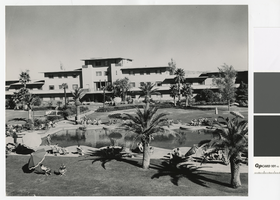
Photograph of courtyard area and outdoor swimming pool at the Flamingo Hotel (Las Vegas), circa 1940s
Date
Archival Collection
Description
Guests sit in the courtyard area around an outdoor pool at the Flamingo Hotel in the 1940s.
Site Name: Flamingo Hotel and Casino
Address: 3555 Las Vegas Boulevard South
Image
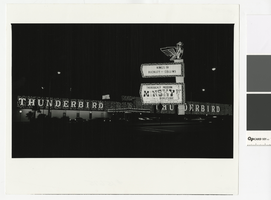
Photograph of the exterior and marquee of the Thunderbird Hotel at night (Las Vegas), circa late1960s
Date
Archival Collection
Description
Nighttime view of the sign in front of the Thunderbird Hotel, and the neon and electric signage spanning the length of the hotel. On the sign in front of the entrance: "Kings IV. Buckley and Collins. Thoroughly Modern Minsky, world famous burlesque, produced by Harold Minsky."
Site Name: Thunderbird Hotel
Address: 2755 Las Vegas Boulevard South
Image
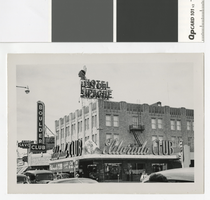
Photograph of the exterior corner of the Eldorado Club, (Las Vegas), late 1940s
Date
Archival Collection
Description
The Eldorado Club on the northwest corner of Fremont and 2nd Streets in downtown Las Vegas. Signs for the Hotel Apache, Boulder Club and Club Savoy (partially hidden) are also seen.
Site Name: Eldorado Club
Address: 128 East Fremont Street
Image
